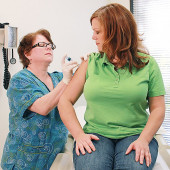Our website uses cookies so we can analyse our site usage and give you the best experience. Click "Accept" if you’re happy with this, or click "More" for information about cookies on our site, how to opt out, and how to disable cookies altogether.
We respect your Do Not Track preference.

Personal health information in electronic health records is increasingly shared in many settings, across disciplines and health care organisations. In recognition of this, considerable work has been done at the highest professional levels around patient record access, data security and the privacy safeguards required of the new systems.
But what isn’t known is how well this area of work is understood by nurses working directly with patients in the community.
Through our roles at the New Zealand Nurses Organisation, we were able to identify this as an area that would benefit from research. We wanted to identify the privacy implications for nurses that the many recent developments in health information technology and the increasing use by multi-disciplinary teams had brought with them.
Last year, we successfully applied to the Office of the Privacy Commissioner for funding under its Privacy Good Research programme. Now that the research has been completed, we will be presenting our findings during the Privacy Research Symposium on 15 December in Auckland during Privacy Research Week (12-16 December).
Research methods
The study used a mixed methods approach. This included a review of current guidelines and codes related to privacy, followed by individual, paired and focus group interviews with key stakeholders, including 22 nurses working in community settings. The interviews were with district nurses, practice nurses, nurse leaders and managers, as well as professional nursing and medico-legal advisers.
The interviews with the nurses working in community settings covered those working in rural and urban settings. Ethics approval was gained from the Victoria University of Wellington Human Ethics Committee.
Research findings
What we found was that each site had distinctly different experiences and approaches to the use of e-health records and other technologies such as smart phones and tablets.
In the rural setting, inter-professional communication was enhanced because people usually knew one another but privacy sometimes became problematic for the same reason.
In one urban setting, all notes were handwritten in traditional patient files, and the lack of shared electronic records across providers and multidisciplinary teams limited the potential of e-records. In another, good operability and user acceptance were reported.
We recorded poor integration of multi-disciplinary records and problems incorporating peripheral technologies such as recorders and cameras. Although nurses had access to some electronic files, this was patchy.
While nurses in all the case studies had good understanding of patient privacy and confidentiality, for many reasons, the full potential of e-health was far from being realised.
We found optimal health IT usage was hindered by a number of causes, including a lack of integration between IT systems (more so in some areas than others), problems with managing multiple computer log-ins and passwords, an inability to fully replicate nursing practice electronically (for example difficulties storing and accessing high resolution digital photographs of wound healing progress), and only intermittent access to the internet.
We concluded that greater understanding by the developers of nursing practice requirements, and of the practicalities of the role, is urgently required. Nurses also need individualised education, consistent messages and support to integrate e-health into their practice.
However, we did find that, on the whole, nurses have good understanding of the privacy implications of electronic patient records. We identified some confusion related to the inadvisability of nurses accessing their own health records, and of the use of patient notes for writing case studies or journaling. These findings informed the development of new summary documents and advice regarding the use of records for study or reflective practice. These have now available on the NZ Nurses Organisation website.
This is a fast moving area with far-reaching consequences for practice. Nurses have a key role in educating patients and facilitating patient use of technology. It is essential nurses continue to inform developments and are informed and supported to use new technology safely and optimally.
The findings will be presented at the Privacy Research Symposium organised by the Office of the Privacy Commissioner in Auckland on 15 December and published in the Journal of Telemedicine and Telecare.
Image credit: A nurse giving a woman a flu vaccine shot in the US - CDC/Doug Jordan (Public Domain).
Back